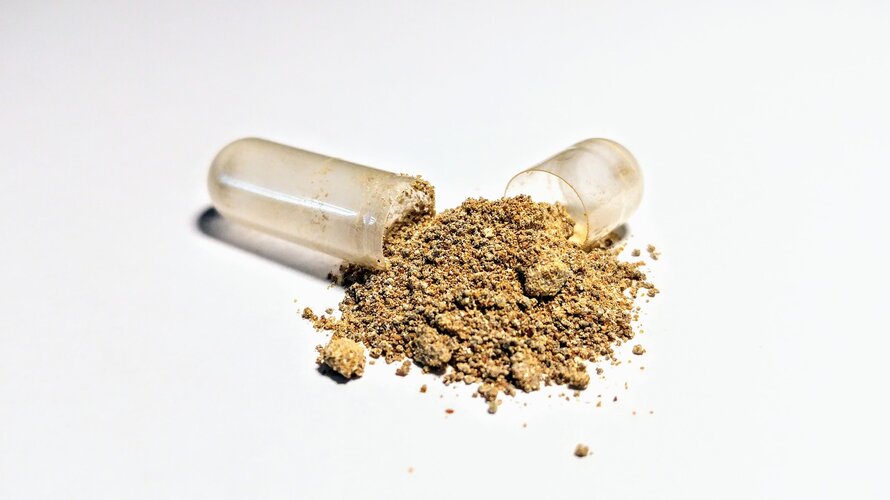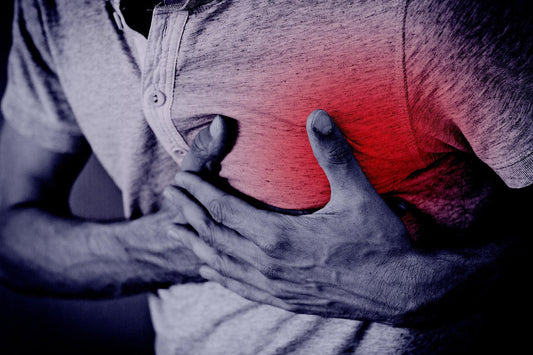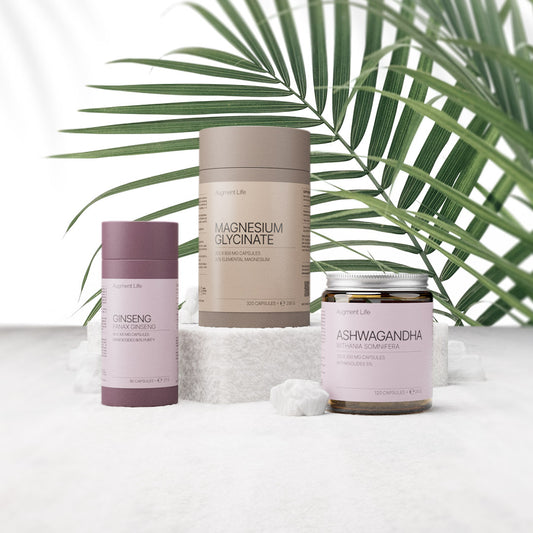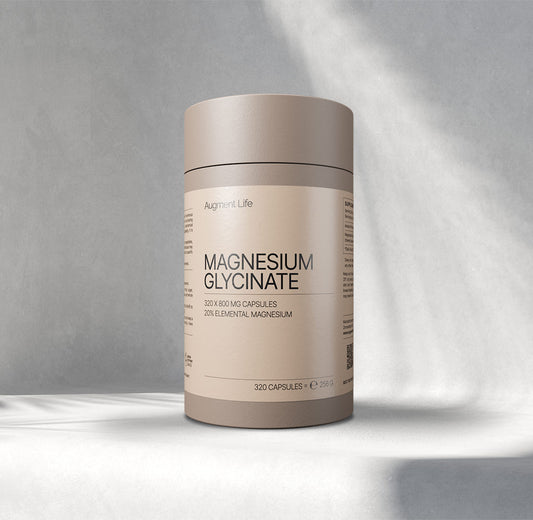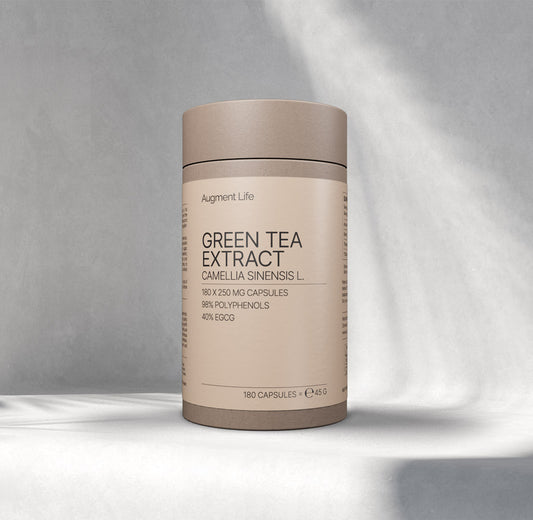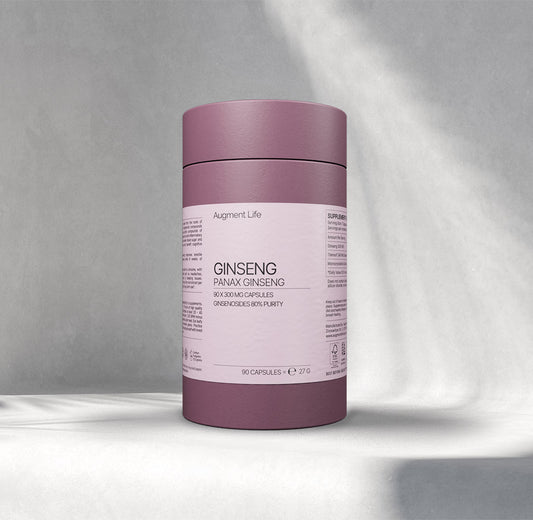Ashwagandha is an Ayurvedic plant that has been used for centuries for various medical purposes, and we have yet to discover its full potential. Native to India, the roots of this plant help relieve stress and anxiety and boost energy.
Keep reading and find out the health benefits of ashwagandha, how to take ashwagandha, and the right dose of ashwagandha.
Why is Ashwagandha so powerful?
Ashwagandha (lat. Withania somnifera), also known as winter cherry or Indian ginseng, is a traditional Ayurvedic plant native to India. It was and still is used in several medicinal uses, mostly for its calming and relaxing effect. In Ayurvedic medicine, ashwagandha is considered Rayasana, or something that helps mantain youth.
Ashwagandha recently became popular worldwide as a dietary supplement prepared from the plant's root. Extensive research showed the root contains a rich phytochemical composition, mainly made up of:
- witanolides - witanopherin A, witanolides A-Y, witanone, witadomniferin A, and witasomniferols A-C,
- alkaloids - witanin, somniferin, somnin, tropin, somniferinin, pseudowitanin, pseudotropin, choline, kuskohigrin, isopeletierin, and anaferin,
- flavonoids - 3-O-rutinoside, 6,8-dihydroxycemferol, quercetin and its glycosidic derivative, 3-O-rutinoside-7-O-glucoside,
- others - saponins, coumarins, sterols, chlorogenic acid, resins, lipids, carbohydrates and fatty acids (1).
Ashwagandha - Health Benefits
Active compounds found in the roots of ashwagandha plants make it a very potent treatment for a variety of medical conditions.
Managing stress and anxiety
Probably the most known health benefit of taking ashwagandha supplements is relieving stress and anxiety. This happens due to several mechanisms in our organisms:
- decrease of the activity of the hypothalamic-pituitary–adrenal (HPA) axis, which induces the release of the stress hormone cortisol and the steroid hormone dehydroepiandrosterone, both of which are severely increased under stress conditions,
- anti-inflammatory effects,
- antioxidant effects.
The calming effect of ashwagandha has frequently been proven in human trials (2, 3, 4), and it's considered to be an anxiolytic (preventing anxiety), and an adaptogen (helps with adaptation to stress).
Along the lines of stress and anxiety, early research shows that ashwagandha can help in the treatment of depression and schizophrenia (1). This is based on the studies that found how ashwagandha can improve brain function, memory, cognitive function, and attention. However, more research needs to be conducted.
Ashwagandha also helps with insomnia and other sleep disorders, which is connected with its calming and relaxing effect on the body (5).
Improves memory and attention
A 2024 study by Leonard et al. (6) investigated the impact of ashwagandha supplementation on cognitive function and mood. The study tested the effects of 225 mg of liposomal ashwagandha root and leaf extract, and participants took it every day with breakfast for a month.
The results show that ashwagandha improved attention, vigilance, and memory, as well as reduced tension and fatigue.
Boosting energy and exercise performance
The second most popular use of ashwagandha is its ability to offer you more energy and increase your muscle gain through optimized muscle performance. This has been proven in several human trials where supplementation with ashwagandha:
- increased gains in muscle strength (7),
- enhanced maximum oxygen consumption (8),
- increased cardiorespiratory endurance (9),
- helped with faster muscle recovery after exercise (10).
Increases testosterone levels in men
Taking ashwagandha supplements can increase the levels of testosterone and dehydroepiandrosterone, and even increase fertility (11). Studies performed on men with decreased sperm count found that treatment with ashwagandha increased sperm concentration and motility (12).
The studies mentioned above, that found ashwagandha increases exercise performance, often found that it also increases testosterone levels in men.
Helps with menopausal symptoms
One study tested 300 mg of ashwagandha root extract twice daily on menopausal women with symptoms like hot flashes, insomnia, and migraines (13). The testing phase lasted for 8 weeks and included over 90 women.
The study found that the group who took ashwagandha:
- had fewer hot flashes, night sweats, headaches, and anxiety,
- slept better,
- had more energy,
- experienced less vaginal dryness,
- expressed more interest in sex.
None of the participants experienced any troublesome side effects.
Ashwagandha - Safety
The safety of using plant extracts and supplements containing ashwagandha has been documented for years. The evidence of this plant's low toxicity can be tracked ever since it was first used.
Minor side effects that were noticed are:
- nausea and vomiting,
- diarrhea,
- drowsiness.
However, ashwagandha can be contraindicative when taken together with other drugs or in certain medical conditions:
- in men suffering from prostate cancer,
- in people suffering from depression who are taking barbiturates or benzodiazepines,
- in people suffering from autoimmune diseases,
- patients with hyperthyroidism,
- patients suffering from liver issues,
- in pregnant or breastfeeding women (not enough evidence on safety yet).
There is also not enough evidence to confirm ashwagandha's safety after 3 months of consumption. Talk to your health care provider before starting to take a new dietary supplement.
Ashwagandha - Dosage
One of the limitations of the research conducted on ashwagandha so far is the inconclusive information on what the optimal dosage is. Various studies used anything between 250 to 1250 mg per day, but 250-600 mg daily seems to be the most used dose (1). One 2024 study found that taking even up to 1000 mg per day for two months is safe (14).
The amount of ashwagandha you take daily can be split up into more doses, and taken before a meal or after it. You also might have to take ashwagandha for at least two months before noticing any positive changes.
Literature:
- Mikulska P, Malinowska M, Ignacyk M, Szustowski P, Nowak J, Pesta K, Szeląg M, Szklanny D, Judasz E, Kaczmarek G, Ejiohuo OP, Paczkowska-Walendowska M, Gościniak A, Cielecka-Piontek J. Ashwagandha (Withania somnifera)-Current Research on the Health-Promoting Activities: A Narrative Review. Pharmaceutics. 2023 Mar 24;15(4):1057. doi: 10.3390/pharmaceutics15041057.
- Salve J, Pate S, Debnath K, Langade D. Adaptogenic and Anxiolytic Effects of Ashwagandha Root Extract in Healthy Adults: A Double-blind, Randomized, Placebo-controlled Clinical Study. Cureus. 2019 Dec 25;11(12):e6466. doi: 10.7759/cureus.6466.
- Lopresti AL, Smith SJ, Malvi H, Kodgule R. An investigation into the stress-relieving and pharmacological actions of an ashwagandha (Withania somnifera) extract: A randomized, double-blind, placebo-controlled study. Medicine (Baltimore). 2019 Sep;98(37):e17186. doi: 10.1097/MD.0000000000017186.
- Pratte MA, Nanavati KB, Young V, Morley CP. An alternative treatment for anxiety: a systematic review of human trial results reported for the Ayurvedic herb ashwagandha (Withania somnifera). J Altern Complement Med. 2014 Dec;20(12):901-8. doi: 10.1089/acm.2014.0177.
- Cheah KL, Norhayati MN, Husniati Yaacob L, Abdul Rahman R. Effect of Ashwagandha (Withania somnifera) extract on sleep: A systematic review and meta-analysis. PLoS One. 2021 Sep 24;16(9):e0257843. doi: 10.1371/journal.pone.0257843.
- Leonard M, Dickerson B, Estes L, Gonzalez DE, Jenkins V, Johnson S, Xing D, Yoo C, Ko J, Purpura M, Jäger R, Faries M, Kephart W, Sowinski R, Rasmussen CJ, Kreider RB. Acute and Repeated Ashwagandha Supplementation Improves Markers of Cognitive Function and Mood. Nutrients. 2024 Jun 8;16(12):1813. doi: 10.3390/nu16121813.
- Wankhede S, Langade D, Joshi K, Sinha SR, Bhattacharyya S. Examining the effect of Withania somnifera supplementation on muscle strength and recovery: a randomized controlled trial. J Int Soc Sports Nutr. 2015 Nov 25;12:43. doi: 10.1186/s12970-015-0104-9.
- Pérez-Gómez J, Villafaina S, Adsuar JC, Merellano-Navarro E, Collado-Mateo D. Effects of Ashwagandha (Withania somnifera) on VO2max: A Systematic Review and Meta-Analysis. Nutrients. 2020 Apr 17;12(4):1119. doi: 10.3390/nu12041119.
- Shenoy S, Chaskar U, Sandhu JS, Paadhi MM. Effects of eight-week supplementation of Ashwagandha on cardiorespiratory endurance in elite Indian cyclists. J Ayurveda Integr Med. 2012 Oct;3(4):209-14. doi: 10.4103/0975-9476.104444.
- Ziegenfuss TN, Kedia AW, Sandrock JE, Raub BJ, Kerksick CM, Lopez HL. Effects of an Aqueous Extract of Withania somnifera on Strength Training Adaptations and Recovery: The STAR Trial. Nutrients. 2018 Nov 20;10(11):1807. doi: 10.3390/nu10111807.
- Lopresti AL, Drummond PD, Smith SJ. A Randomized, Double-Blind, Placebo-Controlled, Crossover Study Examining the Hormonal and Vitality Effects of Ashwagandha ( Withania somnifera) in Aging, Overweight Males. Am J Mens Health. 2019 Mar-Apr;13(2):1557988319835985. doi: 10.1177/1557988319835985.
- Durg S, Shivaram SB, Bavage S. Withania somnifera (Indian ginseng) in male infertility: An evidence-based systematic review and meta-analysis. Phytomedicine. 2018 Nov 15;50:247-256. doi: 10.1016/j.phymed.2017.11.011.
- Gopal S, Ajgaonkar A, Kanchi P, Kaundinya A, Thakare V, Chauhan S, Langade D. Effect of an ashwagandha (Withania Somnifera) root extract on climacteric symptoms in women during perimenopause: A randomized, double-blind, placebo-controlled study. J Obstet Gynaecol Res. 2021 Dec;47(12):4414-4425. doi: 10.1111/jog.15030.
- Vaidya VG, Gothwad A, Ganu G, Girme A, Modi SJ, Hingorani L. Clinical safety and tolerability evaluation of Withania somnifera (L.) Dunal (Ashwagandha) root extract in healthy human volunteers. J Ayurveda Integr Med. 2024 Jan-Feb;15(1):100859. doi: 10.1016/j.jaim.2023.100859.

